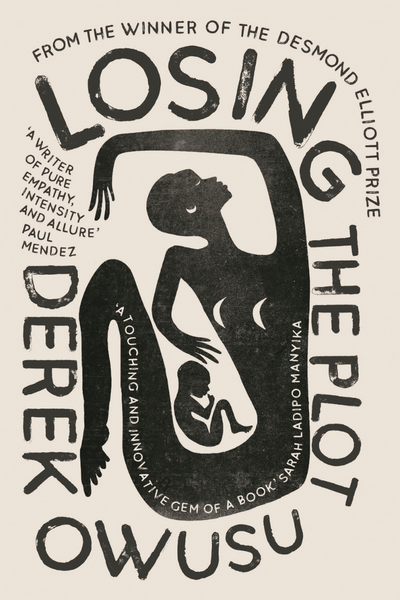Losing the Plot is a delightfully experimental and keenly observed work by the award-winning poet Derek Owusu.
Hailing from North London, Owusu is a writer, poet and podcaster, he co-founded The Black Writers Guild in 2020, which seeks to tackle the lack of representation and inequalities that exist within mainstream publishing in the UK.
His first novel, That Reminds Me, was published by Stormzy’s imprint #Merky Books in 2019 and won the Desmond Elliott Prize. His latest offering, Losing the Plot, like its predecessor, dissects familial relationships and explores how feelings of displacement transcends generations.

Losing the Plot follows the relationship between a Ghanaian woman and her son in Tottenham, North London. Owusu’s prose poem follows the mother’s arrival in London, how she adapts to her new life and how she raises her children. From the margins speaks her son: the young British-Ghanian man who speaks candidly and colloquially about his relationship with his mother. Asterisks are scattered throughout the novel, often following Twi phrases or specific cultural references, and we hear the son’s voice in these asterisked sidenotes. Rather than glossing over these phrases for the reader, the young man interjects with tangential anecdotes and opinions. His voice disrupts the flow of Owusu’s poetic phrases with spoken English, explaining that he hasn’t been to Ghana because people have been ‘banging juj’ and that he is afraid of smelling like ‘Maggi cubes’ when he leaves the house. He doesn’t enjoy spending all day at church and isn’t convinced by his mother speaking in tongues. Owusu’s narrator struggles to connect with his mother, and he rejects aspects of the culture that she represents to him.
However, Owusu goes further and observes the familial relationship beyond these cultural clichés. Ultimately, the speaker must grapple with the way in which his mother demonstrates her love. There is some difficulty communicating with a reserved and almost-secretive mother, but the speaker grows in appreciation of the challenges that his mother has faced and acknowledges this, stating, ‘Being an immigrant is stress’. He also comes to the conclusion that his mother expresses love differently – ‘Small things like that is how you know. She does things her own way, I guess‘. He extends empathy to a woman who has faced her own challenges, a woman uprooted from what was familiar, a woman adapting to a hostile and isolating cultural environment.
At first, I found that multiple voices were hard to follow and that the asterisked phrases disrupted the flow of the narrative. As the story progressed, I adapted better to Owusu’s experimental style. Playing with the form, Owusu allows for a more dynamic reading experience. The contrasting voices of the mother and son initially clash but eventually complement each other. Owusu’s work is stylish and assured, and he builds a world that is relatable to young Black British people. With the use of a London dialect, Losing the Plot also marks how Black British people have created their own language, community and culture, distinct from both the cultures they’ve inherited and the dominant British culture.
Whole chapters of our parents’ lives are unknown to us, and the snippets that we do know are carefully shared. Without intention, these secrets can create tension and distance. Owusu reimagines his mother’s journey to the UK in order to process generational trauma and find peace in empathy. Owusu’s writing is bold, wise, and generous; he amplifies and validates the complexities of inter-generational love.
Losing the Plot was published by Canongate Books on 3rd November 2022.
